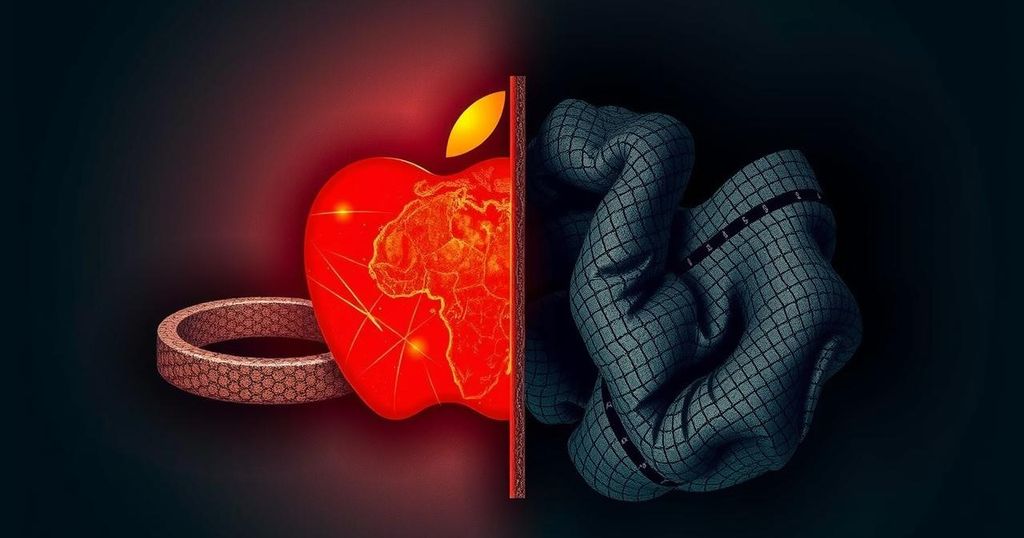The DRC has filed criminal charges against Apple for allegedly using conflict minerals sourced from violence-afflicted areas in Africa, invoking concerns regarding ethical supply chains and corporate accountability. The case underscores the complex interplay between resource extraction and human rights violations, prompting scrutiny on multinational companies regarding their sourcing responsibilities.
The Democratic Republic of the Congo (DRC) has initiated criminal proceedings against Apple’s subsidiaries operating in France and Belgium, accusing them of utilizing conflict minerals sourced from sub-Saharan Africa. Legal representatives for the DRC allege that these subsidiaries engage in deceptive practices that mislead consumers regarding the integrity of their supply chains. Conflict minerals, comprising tantalum, tin, tungsten, and gold, often originate from regions afflicted by violence and human rights abuses, particularly in the eastern DRC, where over 200 armed groups exploit the mineral resources.
Conflict minerals have garnered attention due to their ties to armed conflict and atrocities in regions like the DRC, Sierra Leone, and Venezuela. Christoph N. Vogel, a noted authority on the subject, highlighted that these minerals can directly fund violent groups, making their sourcing highly controversial. The DRC’s eastern region, rich in tantalum, tin, tungsten, and gold, remains a hotspot for exploitation amidst ongoing violence and competition among armed factions for control over these resources.
Allegations against Apple were fueled by a meeting between DRC President Felix Tshisekedi and legal representatives, leading to an investigation into the company’s supply chain. Lawyers reached out to Apple CEO Tim Cook, suggesting the possibility of Apple’s supply chain being compromised by unregulated and possibly illegal mineral sourcing. Apple has publicly denied any wrongdoing in the procurement of minerals, asserting that it had implemented measures to suspend sourcing from conflict-affected regions in response to escalating violence.
As the DRC continues its legal efforts in Europe, the case raises broader questions about accountability in supply chains and the responsibility of companies to ensure ethical sourcing practices. The European Union maintains robust regulations to enforce responsible sourcing, prompting the DRC’s legal pursuit to highlight the critical need for transparency in the mineral trade that impacts local communities suffering from conflict.
The ongoing conflict in the DRC and the exploitation of mineral resources necessitate not only corporate accountability but also adequate legislation and oversight to curb smuggling and human rights abuses in the region. The international community is urged to exert pressure on nations harboring militias to disrupt the cycle of violence sustained by conflict minerals.
Effective sourcing frameworks must adhere to guidelines set by the OECD, emphasizing transparency, risk assessment, third-party audits, and annual supply chain reporting. Failure to address these issues not only perpetuates cycles of violence but also undermines corporate accountability in a globalized economy, which the DRC seeks to change through its legal actions against Apple.
The Democratic Republic of the Congo is a nation rich in natural resources, particularly minerals referred to as conflict minerals, which are often sourced from zones experiencing armed conflict and severe human rights violations. These minerals can finance violent groups, leading to the DRC’s intense scrutiny of international corporations involved in their supply chains. Apple, despite being a global technology leader, has faced criticism regarding the ethical implications of its mineral sourcing practices, particularly in relation to the conditions faced by workers in these mines.
In conclusion, the DRC’s legal actions against Apple highlight the urgent need for ethical sourcing in industries reliant on conflict minerals. The case serves as a critical reminder of the responsibilities corporations hold in ensuring not only compliance with international regulations but also promoting human rights and community welfare in regions affected by exploitation and violence.
Original Source: www.aljazeera.com






